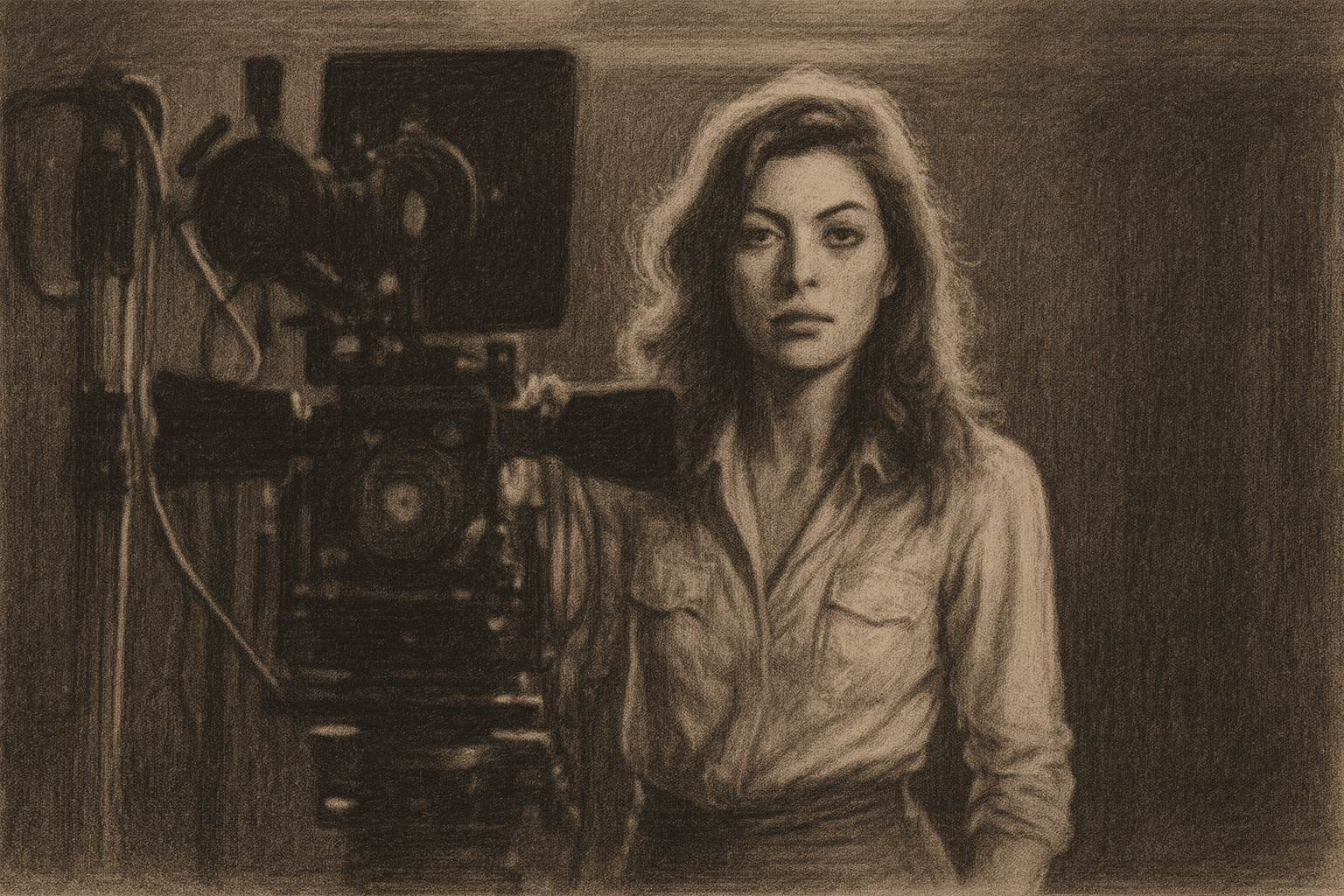Women behind the Camera: Celebrating Top Female Film Directors
2023 can be declared the year of female triumph in cinema. The success of the "Barbie" movie compelled the world to focus not just on the role of women in society, but also on their influence in the director's chair because the highest-grossing film of the year was directed by a woman.


Female film directors have made significant contributions to the world of cinema, yet they remain underrepresented in the industry. For many years, the film industry was dominated by men, both in front of and behind the camera. However, in recent years, there has been a growing movement to promote gender equality in Hollywood, and as a result, we are seeing more and more female directors at the helm of major films.
Female directors bring a unique perspective to their work, which is often reflected in the films they make. They are often drawn to stories about women and girls, and they often challenge traditional gender roles and stereotypes. Female directors have also made significant contributions to the development of new cinematic styles and techniques.
They are brave and bold, pushing past old ideas and creating fresh, exciting movies that make us think, feel, and dream. With passion in their hearts and incredible ideas in their minds, these women make movies that are full of life, love, and creativity. They turn their unique visions into films that light up the big screen, breaking barriers and opening up new possibilities in the world of film directing. With unwavering determination and a passion for storytelling, these women have navigated the tides of evolution, carving their unique paths in an industry once overshadowed by male dominance.
Let’s embark on a journey through the lens of these remarkable women and discover the extraordinary world they create behind the scenes and on the screen!
The Evolutionary Journey of Women in Directing
In the heart of female directors’ evolution lies not just technical expertise, but a reservoir of creativity, vision, and resilience. These pioneering spirits didn’t just adapt to the changing landscapes; they became formidable architects of cinematic innovation, pushing boundaries and challenging the status quo. Their presence resonates with a powerful echo, redefining leadership roles and ushering a new era that celebrates inclusivity, authenticity, and the remarkable prowess of women in cinematography.
🎬 Early Pioneers (1890s-1920s) 👩
As we step back in time to the late 19th and early 20th centuries, the advent of cinema saw a handful of courageous women venturing into the uncharted territories of filmmaking. This era gave rise to pioneers like Alice Guy-Blaché and Lois Weber, who broke through the cinematic glass ceiling. Alice Guy-Blaché, for instance, left an indelible mark by directing "The Cabbage Fairy" (1896), considered one of the first narrative films. Lois Weber, renowned for her groundbreaking silent films, defied societal norms to become trailblazers in a film industry overwhelmingly dominated by men. In these nascent days of cinema, women found themselves with more open doors, even actively participating in scriptwriting, directing, and studio management. However, as the industry evolved, gender-based barriers emerged.
📽️ Challenges and Stereotypes (1930s-1960s) 🚫
Fast-forward to the glitzy Golden Age of Hollywood from the 1930s to the 1960s, and the narrative takes a different turn. The industry, known for its male-dominated landscape and iconic male directors and stars, posed significant challenges for female directors. Discrimination, limited opportunities, and the prevailing belief that women couldn't lead major productions hindered their progress. However, a few remarkable women managed to make their mark during this period. Dorothy Arzner, for example, directed a string of successful films and is credited with inventing the boom microphone, revolutionizing sound in cinema.
🎥 Independent Filmmaking (1970s-1990s) 🚺
The latter half of the 20th century ushered in the rise of the independent film movement, offering new horizons and opportunities for female directors. Figures like Barbara Loden, who directed and starred in "Wanda" (1970), and Claudia Weill, celebrated for "Girlfriends" (1978), emerged as distinct voices in cinema. These directors showcased their talents and storytelling prowess in a transforming cinematic landscape, unafraid to explore unconventional and intimate narratives. Independent filmmaking provided a canvas for female directors to experiment and narrate stories that might not have found a platform in the mainstream.
🌟 21st Century Renaissance (2000s-Present) 💪
The dawn of the 21st century marked a turning point in the narrative of female directors. Kathryn Bigelow's historic Academy Award win for "The Hurt Locker" (2008) stands as an iconic moment when a long-standing glass ceiling was shattered. This pivotal achievement signaled a shift in the industry, with more women venturing into mainstream filmmaking. As the century unfolded, more women embraced the director's chair, and their work gained widespread recognition and critical acclaim. This era witnessed a remarkable surge in opportunities for female directors to helm major productions, leading to groundbreaking films such as "Wonder Woman" (2017) under the directorship of Patty Jenkins.
The quest for diversity and inclusivity in the film industry has spurred a substantial transformation in opportunities for female directors. Figures like Greta Gerwig and Chloé Zhao have ascended to prominence, earning accolades for their boundary-pushing work. Their ability to capture a diverse array of authentic stories has effectively altered the landscape of contemporary cinema.
Elevate your filmmaking with the tools that top directors trust!
Start using Filmustage to optimize your pre-production process.
Notable Female Directors 🏆
Within the expansive tapestry of cinema, where narratives come to life and feelings interplay, a cadre of exceptional women have etched their narratives with compelling tales, visual brilliance, and a unique storytelling prowess. These distinguished female directors have redefined the filmmaking landscape, imprinting it with their artistic signatures across diverse genres.
Kathryn Bigelow

Kathryn Bigelow stands as a testament to artistic excellence, trailblazing in the realm of filmmaking. With a career spanning decades, she has directed critically acclaimed films that explore complex themes and intense narratives. Her crowning achievement came in 2008 when she became the first woman to win the Academy Award for Best Director for "The Hurt Locker". This war drama not only broke gender barriers but also set a new standard for cinematic storytelling. Bigelow's knack for gripping storytelling and her ability to delve deep into the human psyche make her one of the most influential directors of our time.
Greta Gerwig

Greta Gerwig's ascent in the cinematic universe has been truly remarkable. Known for her unique and authentic storytelling, she has captured the hearts of audiences worldwide. Her directorial debut, "Lady Bird" (2017), earned widespread acclaim and garnered five Academy Award nominations. Gerwig's ability to explore the complexities of human relationships with humor and sincerity has made her a celebrated voice in modern cinema. Her work consistently defies conventions, challenging traditional narratives and ushering in a new era of filmmaking.
Her latest work, the fantasy comedy "Barbie" (2023), became a cultural phenomenon that transcended the silver screen even before its release. It not only became the highest-grossing film of 2023 but also set records as the highest-grossing film directed by a woman and the top earner for Warner Bros.
Chloé Zhao

Chloé Zhao's meteoric rise to prominence has been nothing short of remarkable. Her work, characterized by its breathtaking cinematography and intimate storytelling, has earned her critical acclaim and numerous accolades. Her film "Nomadland" (2020) not only won the Academy Award for Best Director but also portrayed the nomadic lifestyle in a way that felt both authentic and poetic. Zhao's unique ability to capture the essence of human connection in vast landscapes sets her apart as a visionary director.
Sofia Coppola

Sofia Coppola, a multi-talented filmmaker, has carved her niche in the world of cinema with her distinctive storytelling and visual aesthetics. She gained widespread recognition for her film "Lost in Translation" (2003), which earned her an Academy Award for Best Original Screenplay. Coppola's films, often characterized by their dreamlike atmosphere and introspective narratives, continue to captivate audiences and redefine contemporary cinema.
Lina Wertmüller (1928-2021)

Lina Wertmüller, an Italian director, made history in 1977 by becoming the first woman ever nominated for an Academy Award for Best Director for her film "Seven Beauties". Her audacious storytelling and bold narratives challenged societal norms and pushed the boundaries of cinematic storytelling. Wertmüller's influence can be seen in the work of many contemporary female directors, making her a pioneer in the truest sense.
Ava DuVernay

Ava DuVernay is a director, producer, and advocate for social change whose work has redefined the cinematic landscape. Her documentary "13th" (2016), which explores the racial inequality within the criminal justice system, was a powerful call to action and earned an Academy Award nomination. DuVernay's dedication to telling important stories that resonate with social and political relevance has made her a vital force in cinema. She continues to champion diversity and inclusion in the industry, ensuring that underrepresented voices are heard and celebrated.
Jane Campion

Jane Campion, a New Zealand director, is known for her thought-provoking and visually stunning films. Her masterpiece, "The Piano" (1993), received critical acclaim and won her the Palme d'Or at the Cannes Film Festival, making her the first female director to achieve this honor. Campion's storytelling mastery and exploration of complex characters have established her as a cinematic luminary.
Patty Jenkins

Patty Jenkins has made significant strides in the realm of superhero cinema, becoming a trailblazer for women directors in the genre. Her direction of "Wonder Woman" (2017) brought the iconic character to the forefront and shattered box office records. Jenkins' ability to blend action, emotion, and character development has redefined the superhero genre, making her a key figure in contemporary blockbuster filmmaking.
The Future of Women in Film Directing 🚀
As the curtains of the past draw closed, a bright spotlight shines on the future, illuminating the path of women in film directing with promise, innovation, and limitless possibilities. The stage is set, vibrant with fresh narratives, groundbreaking perspectives, and a diversity of voices waiting to echo through the hallowed cinema halls.
As technological advancements and global connectivity propel the film industry into new realms, women directors will be at the forefront, harnessing these tools to amplify their visions, refine storytelling techniques, and reach audiences in innovative ways.
The inclusion of more female directors in the film industry is important for several reasons. First, it helps to ensure that a wider range of voices and perspectives are represented in films. Second, it helps to create more opportunities for women in the film industry. Third, it inspires young girls and women to pursue careers in filmmaking.
The future of women in film directing heralds a dynamic era where gender barriers dissolve, and opportunities abound, allowing the essence of feminine creativity and leadership to shine, influence, and inspire the next chapters of cinematic excellence. In this future, the world will witness a flourishing garden of cinematic marvels, nurtured and cultivated by the impassioned and imaginative minds of women directors.
🎧 This article is available on Spotify!
From Breakdown to Budget in Clicks
Save time, cut costs, and let Filmustage’s AI handle the heavy lifting — all in a single day.